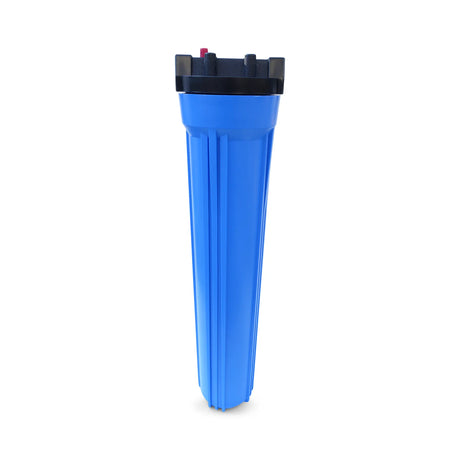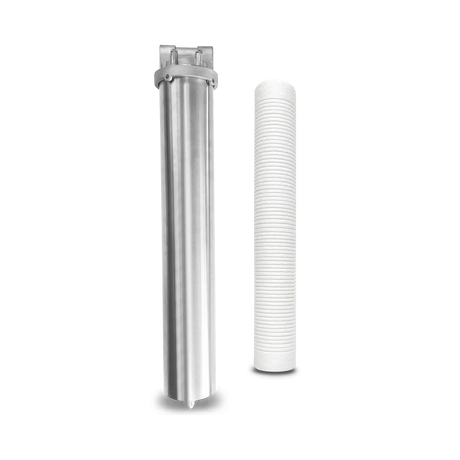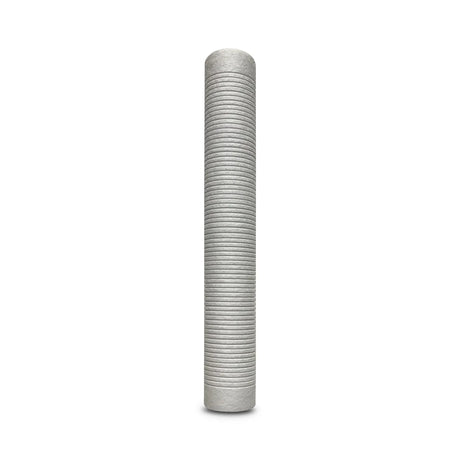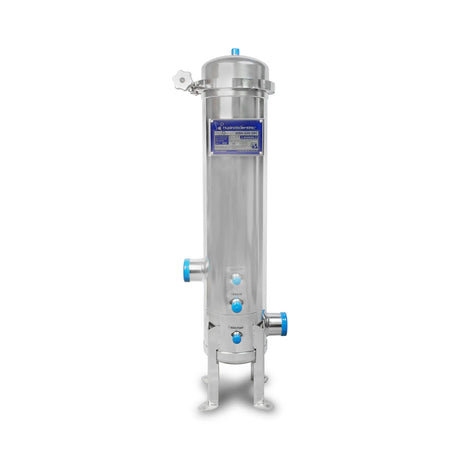Expert Guide: Choosing the Best Water Heater Filter for Your Home
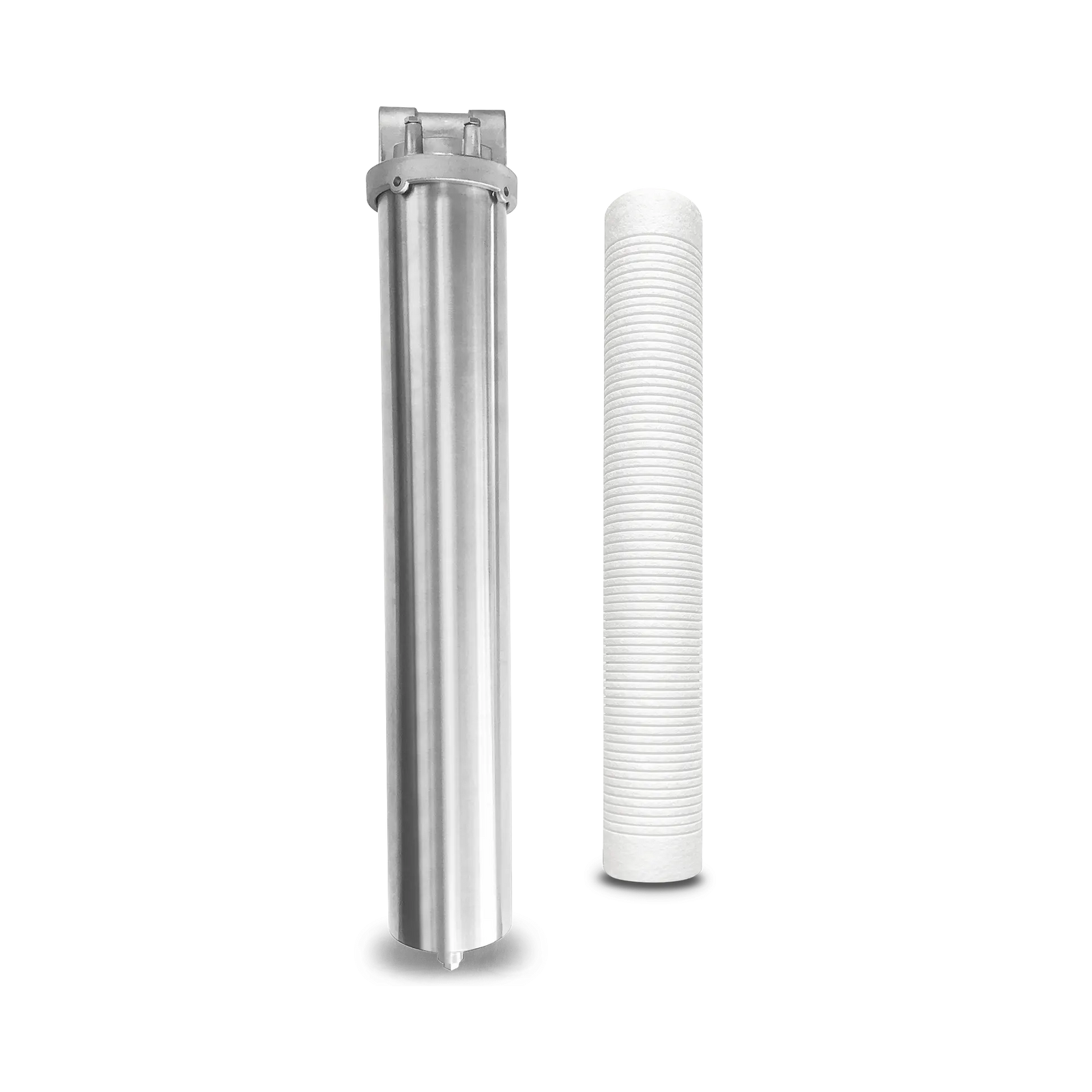
A water heater filter is an essential component in protecting not just your water heater, but also your pipes, fixtures, plumbing connections, and water-using appliances. Hard water, sediment, and scale can wreak havoc on both traditional and tankless water heaters, accumulating on heating elements and decreasing efficiency. This accumulation can lead to premature water heater failure, increased energy costs, and potential damage to your entire plumbing system.
In this comprehensive guide, water heater filter expert Tony Special shares his 40 years of industry experience to help you choose the right filter system for your home. Tony's systems are the most recommended in the industry by water heater manufacturers, thanks to their effectiveness in filtering out sediment and using a special blend to loosen existing scale and prevent new scale formation.
Water Heater Basics – What You Need to Know
Before delving into the world of water heater filters, it's crucial to understand what a water heater is and the different types available:
A water heater is an appliance designed to produce a continuous supply of hot water at a preset temperature. These devices may also be referred to as hot water heaters, hot water tanks, boilers, or heat exchangers. Water heaters are used in both domestic and industrial settings to heat potable or non-potable water.
Water heaters come in two main types:
- Tank water heaters: These systems store and preheat water, using energy to maintain the water temperature until it's needed. While common, they can be less energy-efficient as they continuously heat water, even when it's not being used.
- Tankless water heaters: Also known as on-demand water heaters, these systems heat water as it's needed. They're more environmentally friendly and can save 21% to 43% on water heating costs annually compared to tank systems.
Regardless of the type of water heater you have, proper filtration is crucial for maintaining efficiency and longevity.
The Critical Role of Water Heater Filters
Water heater filters play a vital role in protecting your investment and ensuring the efficient operation of your water heating system. Here's why they're so important:
- They extend the life of your water heater by preventing scale buildup and sediment accumulation
- They help avoid additional maintenance and costly repairs or system replacements
- They ensure your water heater works as efficiently as possible, reducing energy costs
- They help keep operating costs lower in both the short and long run
Water heater filters work by inhibiting or stopping scale formation. They retain hardness minerals, preventing them from accumulating on heating elements or the bottom of the water heater. In tankless systems, the scale inhibitor product prevents scale from accumulating on internal surfaces.
One of the best scale control products on the market is Siliphos. It takes a two-fold approach to preventing scale and corrosion:
- It forms a thin protective layer on metal surfaces to prevent scale and corrosion deposits
- It helps loosen existing scale deposits
When choosing a water heater filter, ensure it contains Siliphos or a similar high-quality scale control product.
5 Essential Considerations When Choosing a Water Heater Filter
1. The Necessity of Water Heater Filters
The first and most crucial point to understand is that if you have a water heater, you need a good filter. This is true regardless of whether you have a tankless water heater or one with a tank, especially if you have any water hardness or sediment in your incoming water supply.
As Tony emphasizes, "An effective water heater filter is essential for all water heaters. It's just not worth risking your water heater." A good filter system and replacement filters don't have to be expensive, but they must effectively address the problem at its core.
2. Comprehensive Protection: Sediment Removal and Scale Prevention
When selecting a water heater filter, it's crucial to ensure it accomplishes three important tasks:
- Removes sediment, dirt, rust, and other particulate matter commonly found in incoming water supplies.
- Loosens existing scale deposits on your water heater. Ideally, a filter should be installed with a new water heater, but if not, install one as soon as possible.
- Stops new scale from forming. Some anti-scale products form a thin protective layer on metal surfaces to inhibit scale and corrosion deposits.
Tony warns, "Many so-called water heater filters don't actually 'filter' the water. That's misleading. These systems don't remove particulates like sediment and dirt or address existing scale problems—they just stop scale from forming. You need a filter that removes particulate matter, loosens existing scale deposits, and stops new scale from forming. Otherwise, what's the point of your water heater filter?"
3. Choosing the Right Filter Housing: Stainless Steel vs. Plastic
When it comes to filter housings, you have two main options: stainless steel and plastic. Each has its pros and cons:
Stainless Steel Housings:
- More durable and resistant to corrosion and chemicals
- Less likely to leak or burst
- Longer lifespan overall
- More expensive than plastic options
Plastic Housings:
- More affordable
- Can be durable if manufactured correctly
- Important to choose one made from a single casting mold
Tony advises, "Stainless steel is more durable and the better choice, but it's also more expensive. Well-made plastic housings are fine too. The important thing is how the plastic housing is manufactured. Is it made from a single mold—GOOD—or are holes drilled afterward—BAD!"
If you opt for a plastic housing, ensure it's manufactured from a single casting mold and that no holes were drilled after the original casting. Drilled holes can weaken the filter head, leading to leaks or bursts.
4. Skip the Pressure Gauge for Residential Systems
While a pressure gauge might seem like a useful feature, Tony advises against it for home water heater filter systems. He states, "A gauge on a home water heater filter system is a gimmick. It may look useful, but it'll be inaccurate for residential use and isn't necessary. Don't pay extra for a gauge."
Water pressure gauges are designed to measure pressure drops, which usually indicate when it's time to replace the filter. However, in residential water heater filters, gauges are often inaccurate due to the low and inconsistent water volumes. They may give false readings, either prompting an unnecessary filter change or failing to indicate when a replacement is needed.
While useful for high-volume commercial applications, gauges are unnecessary for residential systems. Avoiding systems with a gauge can save you money and reduce the risk of misleading readings.
5. The Drawbacks of Template Assisted Crystallization (TAC) Filters
Template Assisted Crystallization (TAC) technology transforms calcium ions into calcium crystals, which are easily rinsed away by the water flow. While this sounds beneficial, TAC filters have significant weaknesses that make them less ideal for water heater protection.
Tony explains, "Template Assisted Crystallization (TAC) filters are effective at reducing scale, but they have significant drawbacks. TAC filters have low flow rates that may not keep up with tankless water heaters. They are also easily damaged by chlorine."
The main issues with TAC filters include:
- Low flow rates, which can reduce the performance of tankless water heaters
- Vulnerability to chlorine damage, which is problematic as most municipal water supplies use chlorine
- Difficulty in determining when the filter needs to be replaced
How Scale and Sediment Damage Your Water Heater and What You Can Do
The Science Behind Scale Formation
Scale is primarily caused by hard water, which contains minerals like calcium and magnesium. These minerals are more likely to precipitate in hot environments like water heaters. When water is heated, minerals rapidly attach to heating elements and other surfaces.
The impact of scale on water heaters is significant:
- Scale deposits make water heaters less efficient because the scale absorbs heat before it warms the water
- Scale can clog the pathways inside the water heater, leading to eventual failure
- Over time, scale buildup can significantly reduce the lifespan of your water heater
Sediment Buildup: Sources and Consequences
If your water supply contains debris and you don't have a filter, this debris will inevitably enter your water heater. Sediment, dirt, rust, and other particulates can accumulate at the bottom of your water heater and in other areas.
The consequences of sediment buildup include:
- Reduced efficiency of your water heater
- Potential damage to fixtures and appliances such as showerheads and dishwashers
- Shortened lifespan of your water heater
If you have a significant amount of debris in your water, it's highly recommended to install a point-of-entry filter (also known as a whole house water filter) to capture the debris before it enters your water heater filter and heater. However, even with a whole house filter, a dedicated water heater filter is still recommended to provide anti-scale protection and catch any remaining sediment.
Best Practices for Maintaining Your Water Heater Filter
Proper maintenance of your water heater filter is crucial for ensuring its effectiveness and longevity. Here are some best practices:
- Regular Replacements: Most filters should be changed once a year. However, the exact timing can depend on your water usage and the hardness of your water supply.
- Visual Checks: Perform visual checks every six months to assess the condition of your filter.
- Listen for Siliphos: Turn the filter upside down and listen for the Siliphos balls inside. These balls dissolve over time, and once they are gone, it's time to replace the filter.
- Mark Your Calendar: The best way to determine when to change the filter is by marking the calendar when you install a new one.
- Flush Your Water Heater: Periodically, turn off your water supply and drain the water heater to remove as much debris as possible. Water heaters have a drain at the bottom for this purpose.
Top Water Heater Filter Systems Recommended by Experts
The Original Water Heater Filter System for Reliable Performance (AMF-20S)
The AMF-20S 20" Water Heater Filter System offers a 16 GPM flow rate and includes:
- Premium 20-inch water filter housing
- AMF-SDR520 scale inhibitor cartridge
- 5-micron deep-grooved water filter cartridge with scale inhibitor
- Built-in pressure release valve (PRV) to release pressure before changing filters
Key features:
- Made from a single mold casting with 15% more material for durability
- Grooved design increases surface area, extends cartridge life, and improves filtration efficiency
- Suitable for all commercial and residential water heaters, including major brands like Bosch, Navien, Noritz, Rheem, Rinnai, and more
This filter system offers comprehensive protection for residential and commercial water heaters. It features a high flow rate and an advanced scale inhibitor cartridge. The system's durable construction and deep-grooved design ensure efficient filtration and easy maintenance. Compatible with major heater brands, the AMF-20S is a reliable choice for protecting your water heater.
The Premium Water Heater Filter System for Ultimate Protection (SS210-TWH)
The SS210-TWH is an extremely durable water heater filter system that features:
- 316L stainless steel housing for peace of mind
- AMF-SDR520 scale inhibitor cartridge
- Up to 16 GPM flow rate
- 3/4" or 1" FPT connections for optimal flow
Key features:
- Highly durable and resilient to corrosive substances and chemicals
- Includes a premium 5-micron water filter cartridge with Siliphos scale control product
- Rigid construction with 68 deep grooves, increasing surface area and enhancing contaminant holding capacity
- Drain opening at the bottom of the housing for easy flushing and cleaning
This is a robust water heater filter system with a corrosion-resistant stainless steel housing. It offers efficient scale prevention with its deep-grooved cartridge and scale inhibitor media. High performance and easy maintenance. It's a durable solution for long-term water heater protection.
Protecting Your Investment with the Right Water Heater Filter
Choosing the right water heater filter is crucial for protecting your investment, ensuring efficient operation, and extending the life of your water heater. By considering the factors outlined in this guide - from comprehensive protection against sediment and scale to choosing the right housing material - you can make an informed decision that will benefit your home's water system for years to come.
Remember, the small investment in a quality water heater filter can save you significant amounts in energy costs, repairs, and premature replacements. Whether you opt for a plastic or stainless steel system, ensure it offers complete protection against sediment, existing scale, and future scale formation.
By following the maintenance best practices and choosing a system that meets your specific needs, you can enjoy a steady supply of clean, scale-free hot water while protecting your water heater and connected appliances. Don't wait until you experience problems - invest in a quality water heater filter today and enjoy the peace of mind that comes with a well-protected home water system.


